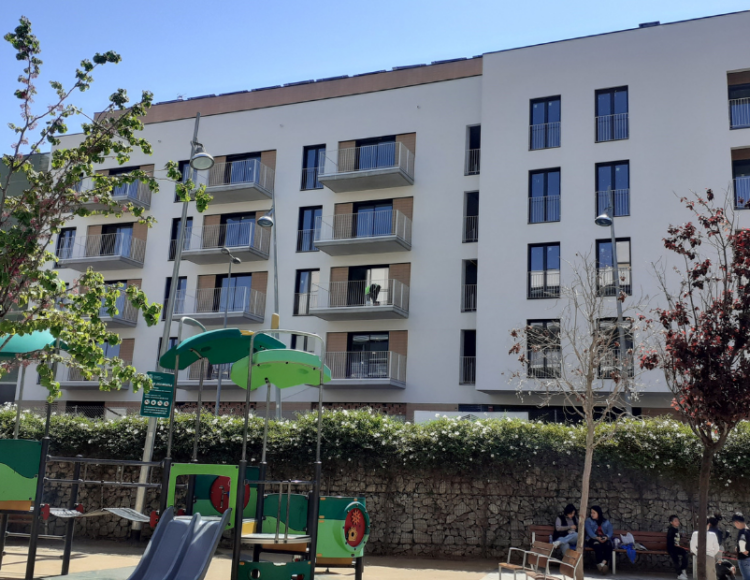In a significant milestone this October, 38 new social housing rental units have been handed over to their new tenants. This handover marks the culmination of a long and innovative initiative that began in 2020 under the EU-funded syn.ikia project, of which Housing Europe is a partner. Developed by the Catalan Institute of Land (INCASÒL) and the Catalan Institute for Energy Research (IREC), this pioneering initiative demonstrates that social housing can play a vital role in contributing to a fair and sustainable transition.
A pioneering initiative in Catalonia
The Fondo neighbourhood building stands out as a groundbreaking model for social housing in Catalonia. With a design that allows the building to generate more energy than it consumes, it includes an innovative concept that foresee the surplus energy to be distributed to nearby public services, such as the Fondo Health Centre. This “energy synergy” showcases how social housing can meet environmental goals while also addressing the needs of vulnerable populations. One of the added values of this project is that by prioritizing social inclusion, it promotes access to affordable housing for all.
Innovation redefining social housing
Key features of the building, such as rooftop photovoltaic panels, centralized heating and hot water systems, and a smart energy management system, underscore its exceptional energy efficiency. An integrated design approach, involving a multidisciplinary team, has optimized the energy, economic, and social aspects of the building, ensuring a minimum energy demand. The energy management system facilitates optimized consumption, enhancing sustainability while supporting tenants’ comfort.
Tenants are central to this initiative, and their engagement will be crucial in the next steps. In the coming months, a monitoring process will be established, involving tenants to assess the real benefits of living in this innovative social housing. This participatory approach not only empowers residents but also ensures that their needs and feedback help shape the ongoing success of the project.
The real impact of Sustainable Plus Energy Neighbourhoods
The syn.ikia project in Santa Coloma exemplifies a dual-purpose model: it promotes energy-positive communities while providing affordable, high-quality housing to those in need. The handover event was attended by regional and local officials, including Sílvia Paneque, Councillor for Territory, Housing and Ecological Transition, who highlighted the government’s commitment to sustainable and affordable housing for those in need. The rent for these units is tailored to income, ranging between 365 and 486 euros per month, making it accessible for vulnerable groups.
This project illustrates the feasibility of energy-positive social housing and emphasizes how such initiatives can uplift communities while addressing both environmental and social needs. Tenants benefit from affordable rents and housing adapted for accessibility, with certain apartments prioritized for individuals at risk of social exclusion.
Shaping the future of neighbourhoods across Europe
The syn.ikia project, led by the Norwegian University of Science and Technology (NTNU), aims to expand Sustainable Plus Energy Neighbourhoods (SPENs) across various climates and contexts. As a replicable model, syn.ikia highlights how social housing can contribute to resilient communities that actively engage in Europe’s sustainability targets. The Santa Coloma development serves as a powerful example of how social housing is essential for inclusive urban development.
The successful completion of the Santa Coloma project demonstrates the strength of collaborative design and shared vision in creating inclusive, sustainable neighbourhoods. As part of syn.ikia’s broader mission, the Fondo neighbourhood exemplifies the potential of energy-positive solutions to meet social responsibilities, paving the way for a resilient and sustainable future in public housing.
